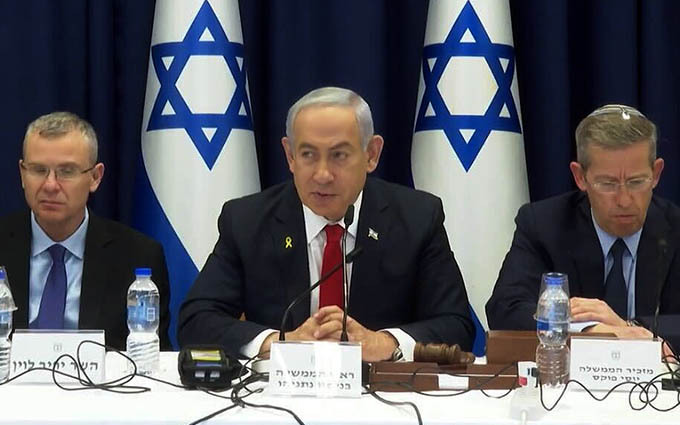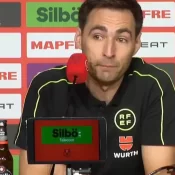
Israel’s cabinet will meet on Tuesday to accept a deal to end the fighting in Lebanon
A top Israeli official said on Monday that Israel’s cabinet would meet on Tuesday to accept a deal to end the fighting with Hezbollah. Meanwhile, a senior Lebanese official said that Washington had told Beirut that a deal could be announced “within hours.”
Israeli officials had earlier said that a deal to end the war was getting closer, but that there were still some problems. Two top Lebanese officials expressed cautious confidence, even as Israel launched more attacks on Lebanon.
A senior U.S. source told the U.S. news website Axios that Israel and Lebanon had agreed to the terms of a deal. A senior Israeli official told Reuters that the meeting on Tuesday was meant to approve the deal.
Danny Danon, Israel’s representative to the UN, said that no matter what agreement was made, Israel would still be able to strike southern Lebanon.
The office of Israeli Prime Minister Benjamin Netanyahu wouldn’t say anything about the Axios story.
The U.S. has been pushing for a deal to end the fighting between Israel and Hezbollah, which is backed by Iran. The fighting started at the same time that Israel was fighting Hamas, an Islamist group in Gaza, but it has gotten much worse in the last two months, making people fear a bigger Middle East war.
In Beirut, Elias Bou Saab, the deputy speaker of the Lebanese parliament, told Reuters that there were “no serious obstacles” left to starting to carry out a U.S.-proposed ceasefire with Israel.
Bou Saab said that the plan would include the Israeli military leaving south Lebanon and normal Lebanese army troops stationed in the border area, which has been a stronghold for Hezbollah for a long time, within 60 days.
He said that a disagreement about who would be in charge of making sure the ceasefire was followed was settled in the past 24 hours by agreeing to create a five-country committee led by the US and including France.
A Western official said that the order in which Israel’s withdrawal, the deployment of the Lebanese army, and the return of individuals who had been forced to leave their homes in south Lebanon had been another problem.
Israeli airstrikes on Beirut keep going.
During the political flurry, fighting has gotten worse. Over the weekend, Israel launched powerful airstrikes that killed at least 29 people in central Beirut. At the same time, Hezbollah, which is backed by Iran, fired 250 rockets in one of its biggest rocket salvoes yet.
On Monday, Israeli airstrikes destroyed more of the southern suburbs of Beirut that are controlled by Hezbollah. The strikes sent clouds of debris over the Lebanese city.
Amos Hochstein, a U.S. mediator, said last week that there had been “significant progress” in efforts to reach a peace agreement after talks in Beirut, Israel, and then back to Washington, D.C.
David Mencer, a spokesman for the Israeli government, said, “We are moving toward a deal, but there are still some issues to address.” He did not say more.
The Israeli ambassador to Washington, Michael Herzog, told Israel’s GLZ radio that a deal was almost done and that “it could happen within days.” Based on a post on X by GLZ senior anchorman Efi Triger, “We just need to close the last corners.”
A second senior Lebanese official, who spoke on the condition of anonymity earlier in the day, said that Beirut had not received any new Israeli requests from U.S. mediators. They said that the mood was positive and that “things are in progress.”
Israel and Hezbollah’s fight turned into a full-scale war in September, when Israel went on the offensive and attacked large parts of Lebanon from the air and sent troops into the south.
Israel has caused Hezbollah a lot of damage by killing its leader Hassan Nasrallah and other top commanders and destroying large parts of Lebanon where the group controls.
The main goal of diplomacy has been to reinstate the ceasefire set by U.N. Security Council Resolution 1701, which stopped the war between Israel and Hezbollah in 2006.
Hezbollah has to pull its troops back about 19 miles (30 km) from the border with Israel, behind the Litani River. Only then can the regular Lebanese army enter the border area.
Hashem says the deal is now in Israel’s hands.
For any deal to be valid, Israeli Foreign Minister Gideon Saar said that two key points would have to be followed through on.
In a broadcast address to the Israeli government, Saar said, “The first is stopping Hezbollah from moving south beyond the Litani, and the second is stopping Hezbollah from rebuilding its force and re-arming in all of Lebanon.”
Very far to the right Amir Ben-Gvir, Israel’s minister of national security, said that the country must keep fighting until it achieves “absolute victory.” “It is not too late to stop this agreement!” he told Netanyahu on X.
But Israel’s Agriculture Minister Avi Dichter said that a deal should be made in Lebanon. “If we say ‘no’ to Hezbollah being south of the Litani, we really mean it,” he told reporters.
Last week, Sheikh Naim Qassem, the head of Hezbollah, said that the group had looked over the U.S. ceasefire plan and given feedback. He also said that any truce was now up to Israel.
The US calls the highly armed Shi’ite Muslim militant group a terrorist organization. They have backed Parliament Speaker Nabih Berri of the Shi’ite Amal movement in his efforts to negotiate.
Tens of thousands of people had to leave Israel’s northern areas because of rocket attacks by Hezbollah, which sided with Hamas at the start of the Gaza war in October 2023. Israel says its goal is to make sure those people can go back home.
Because of Israel’s assault, more than a million people in Lebanon have had to leave their homes.
All Categories
Recent Posts
Tags
+13162306000
zoneyetu@yahoo.com



